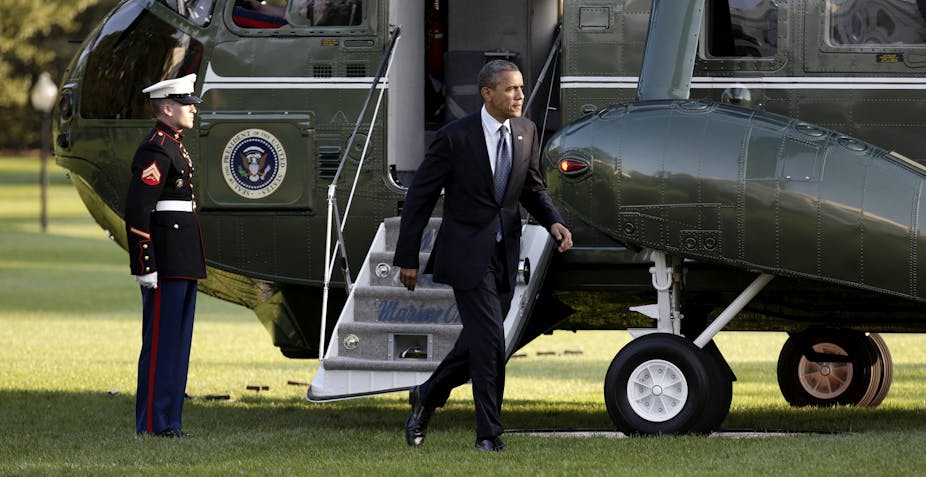In the current American presidential debate, Republican Mitt Romney has criticised President Barack Obama for his reputedly timid approach to the Middle East.
He has promised to restore American leadership in the region, and indeed the world, through a greater activism. Yet Romney’s comments generate genuine questions about whether America can still lead, and if not, how it can restore itself to global eminence, if not preeminence.
The answer to the first question is a resounding “no”. America no longer has the capacity to lead as it once did. The violent attacks on American consulates and embassies, acts of civil disobedience and burning of flags around the globe that we have witnessed in the past few weeks are emblematic of the decline in America’s standing that dates back well over a decade, rather than owing to a temporary loss of leadership.
It is easy for Americans to convince themselves that such protests are the acts of unthinking radicals, that the anti-Islamic film against which they demonstrated is nothing more as a pretext for voicing their opposition to the West, or that such public disaffection is the inevitable result of a process of modernisation in which the US is, at most, a surrogate for the autocratic regimes under which disaffected men suffer in the Arab world.
But this is not simply a complaint about American policies. It is a challenge to America’s role in the world.
Almost in defiance of this criticism, as every speech in this political season attests, Americans are told that America was, is and will remain the greatest country in the world.
It is a country that others seek to emulate and that such opposition is the product of envy, not hostility. To an extent, both presidential candidates have participated in sustaining this charade. They ignore a broad swathe of evidence to the contrary.
It stretches from America’s inability to assist its critical European economic partners in addressing their financial crisis to its incapacity to reassure the Chinese that America is not pursuing an encirclement strategy in Asia when it locates a new base in Australia.
It extends from a failure to achieve consensus about how to effectively engage Iran or North Korea over the problem of proliferation to its unsuccessful attempts to insert itself into the process of regime change in the Middle East and North Africa.
Indeed, rather than leadership and emulation, global public opinion surveys stretching back over a decade resonate with the same view: America, despite its claims to the contrary, is the greatest force for global instability. Many foreigners share this view, not simply the more objectionable outliers such as Chavez in Venezuela or Ahmadinejad in Iran. America can’t get anything done, let alone lead, when faced with this kind of widespread opposition.
But the truth is perhaps more brutal: focusing on its unprecedented military capabilities rather than its diplomatic capacities in the pursuit of its foreign policy goals since the end of the Cold War, America has relied more on its coercive power than an ability to influence others.
This subtle distinction between power and influence has been lost on American politicians, policymakers, academics and the media alike in its parochial political debates. Together, in concert, they have claimed that the coupling of America’s military as a blunt indispensable “force for good” with its alluring hypnotic soft power mix of democracy, unregulated capitalism and pop culture has sustained its right, its capacity and ability act as a global leader.
The crux of the problem is that America possesses the power but not the legitimacy to influence foreign affairs, and both are needed if the US is to reestablish its ability to lead. The portents, however, are not as gloomy as the evidence might suggest.
In a surprising, unacknowledged bipartisan trend, both President Obama and his predecessor, George Bush, have occasionally shown a willingness to sponsor global initiatives.
An appreciation for America’s sponsorship of global initiatives is evident in the continued widespread support for its unheralded campaigns against both human trafficking and piracy on the high seas – initiatives that began under the Bush administration but were continued by President Obama.

In both cases, America pursued criminals in the naked abrogation of the sovereignty of other countries, has bullied foreign governments into creating and enforcing programs to protect victims, and has threatened allies and enemies alike with sanctions.
All this without a peep of the kind of criticism we have witnessed on the streets of capitals around the world in the last month. And the same tendencies are manifest in the sorrow and apologies expressed by Libyans about the recent consulate attack, fully recognising America’s indispensable role in their liberation.
It’s no coincidence that only Libyans, among all the countries in the Arab world, who have expressed remorse about the attacks on American personnel, symbols and property. These initiatives have, in some quarters, gone far in rehabilitating America’s reputation abroad.
The acts of violence against Americans are indefensible and unjustifiable. But demanding leadership as Romney has done, asserting America’s moral superiority or dismissing the protesters on the streets as simply outside the mainstream is an ineffective strategic response, however understandable in this political season in the US.
The restoration of America’s influence for which Romney pines begins with a recognition that it cannot act as a buttress against chaos around the global simply by trying to seize the reins of leadership and using power indiscriminately.
That didn’t work in Iraq, has continued to fail in Afghanistan, and no expedient measures will adequately address the problem of America’s lack of legitimacy.
Rather, America’s leadership must recognise the new realities of a global politics, where power and legitimacy are more intertwined than ever, accept that rebuilding the latter is a longer terms process, and build support for its position by demonstrating a willingness to pursue what its leaders regard as the good ideas of others.

